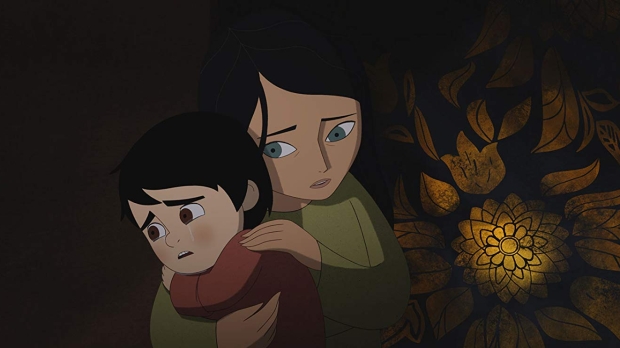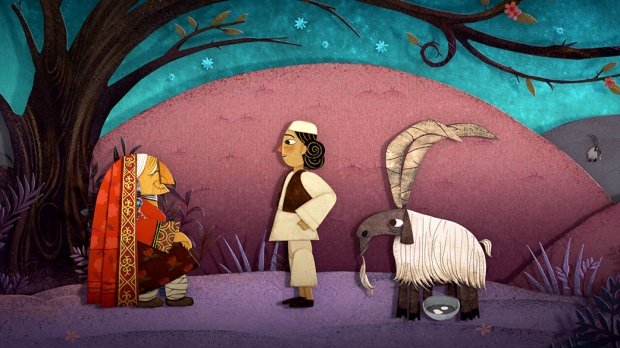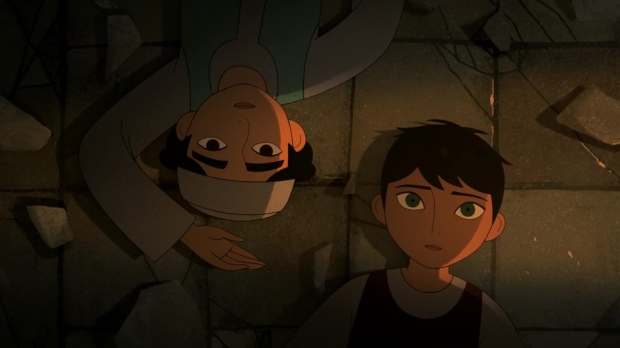Directed by Nora Twomey
Written by Anita Doron, Deborah Ellis

Gloriously direct, “The Breadwinner” (2017) turns the patriarchal trope of a sole provider into an unflinching tale of a young Afghan girl’s determination, fear and resilience under Taliban rule in 2001. Based on Deborah Ellis’ bestselling novel, who returns to write the screenplay, “The Breadwinner” is a gut-wrenching reminder of the violence that women experience under the shadow of modern histories vilest patriarchal systems.
As the boys play solider, it is women who endure, women who spend their days attempting to find semblance amidst the chaos. Both the original novel and the screenplay have been written by Deborah Ellis, with the screenplay in part co-written with Anita Doron. With such a wealth of female filmmakers behind the film’s production, it’s little wonder how “The Breadwinner” manages to encapsulate female oppression from the most tyrannical of archaic patriarchies for verdantly. More importantly, how it refuses to victimise these mothers and daughters, instead, matching the strength they display with the losses they suffer.

Opening-up with concerns over modern-day political coups, Western interference in the East and the severe imposition of female ‘modesty’, Twomey rejects an outright statement on the religious practises of a culture with which she is not a member. It’s a respectful opener, rife with imagery which speaks more than the words do, like America and Britain’s recent history in the region does not need to be stated when the bombastic annihilations of colour illustrate the point enough.
Reversing the term ‘breadwinner’, in which our first thoughts are of a man, usually suited, for some reason in fifties stylings, as the primary caregiver for the family. In Kabul, a woman isn’t in this role, unless her husband, brother’s, cousins or any other man in the family have died, left or are in prison. After her father Nurullah is taken to prison for hiding books in the floorboards, teaching his daughters, Parvana finds herself the breadwinner for her sick mother, her older sister and baby brother. That is of course after she sheds her headscarf, her hair and disguises herself as a boy. With her newfound ‘freedom’, Parvana discovers that “when you’re a boy you can go anywhere you like”, as suddenly she can hold her head high, walk and purchase goods, all with less fear of scrutiny. Here, Saara Chaudry‘s voice acting moves from the sombre tones to a jovial child who is unearthing the brief joys in life, in an otherwise difficult lifestyle.
And this power of the written word, a resentment from educated women, has references which you can locate in Nora Twomey’s direction and animation. The tool which Parvana’s parents use to educate their daughters, much to the disarray of the Taliban, a storybook, a simple, harmless storybook which offers key weapons in the fight of oppression: imagination and freedom, which offer liberation. Mentioned as a writer, Laara Sadiq’s role as such an educated mother, Fattema is soft-spoken, which as the stakes grow higher, morphs into a matriarchal powerhouse of desperation – a woman for who no man will tie-down, even when threatened at knifepoint, beaten or any other atrocities she suffers in the film.
Liberating a profound level of freedom with the text, Executive producer Angelina Jolie works alongside Ellis and Twomey to reinforce the film’s stringency to the truth. The beating we see Fattema endure, the threats of ‘marriage at her age’, sexual violence, arranged marriages and abuse of both daughters, “The Breadwinner”, regardless of its comedic moments, playful characters or visuals does not shy from authenticity.

So please take heed, especially from an advocate of children’s cinema, that “The Breadwinner” is not a children’s film. It’s the antithesis of animation’s place as a respectful genre in the cinematic field. Though, I would implore anyone, that if they sufficiently trust their children are mature enough to watch this film, please encourage them to do so. Stripping back the otherness of cinema, “The Breadwinner” places us into the eyes of children in a culture, in a world which we in Western society only ever see through media’s altered vision. Canadian activist Ellis crafts “The Breadwinner” as starkly human, but nevertheless, it is a warming film of family, it will connect with you regardless of nationality, or at the very least we would hope it does. At its most beautiful, this film is a masterpiece in animation which deserves praise for its manipulation of light, layers and dramatic-symbolic storytelling.
Any readers familiar with Twomey and Cartoon Saloon’s previous titles, “The Secret of the Kells” (2009) and “The Song of the Sea” (2014) will have expectations of ‘The Breadwinner’s’ animation style. A wholly unique form than what s presently on offer from the large studios, and even the independents. What Twomey’s style loses in-depth, remaining in the two-dimensional construct the likes Dreamworks and Disney have since abandoned, she makes up for with a palette of immense colour, transforming Kabut into a rich canvas. Injecting the culture with a zest we are unfamiliar with, the landscape a breath of colour propels it into significance, even the darker moments capture the futility of the task ahead for the family with their foreboding monochromatic shadows.

Quite the opposite, where shadow is the plaything of reality, ‘The Breadwinner’ delves into the cultural stories of Kabul and the Middle East. Snippets of pure escapist storytelling, these blissfully animated segments are awe-inspiring, with a unique blending of multiple formats. They are animated, maintaining Twomay’s two-dimensional style, but they have layers. Almost puppet-like, certainly origami-inspired, as the symbolic jaguars and wolves descend against the young boy, a reminder of so many claimed by war. Ellis so heart-achingly illustrates the maternal vein of the narrative, that it is put upon young Parvana, her mother and sister to keep the family going, their personas reflecting the stories she tells her young brother.
Purposely ambiguous, the film’s ending is bitter-sweet, though refrains from outright misery. “The Breadwinner” earns a spot as a monumentally important piece within the last decade, not only for having a team primarily made up of women, but also for Twomey’s championing a genre which suffers from a hugely lacking diversity. As animation slowly gains a foothold with dramatic representation’s, Hollywood would do well to remember the roots of the genre with the ink-artists of Walt Disney, all women, whose storytelling capabilities continue to manifest limitless story-potentials in ways other film-forms cannot.
Review originally published for In Their Own League: https://intheirownleague.com/2019/11/19/itol-top-50-films-of-the-decade-entry-no-32-the-breadwinner/

